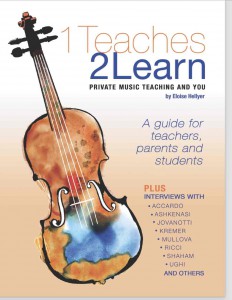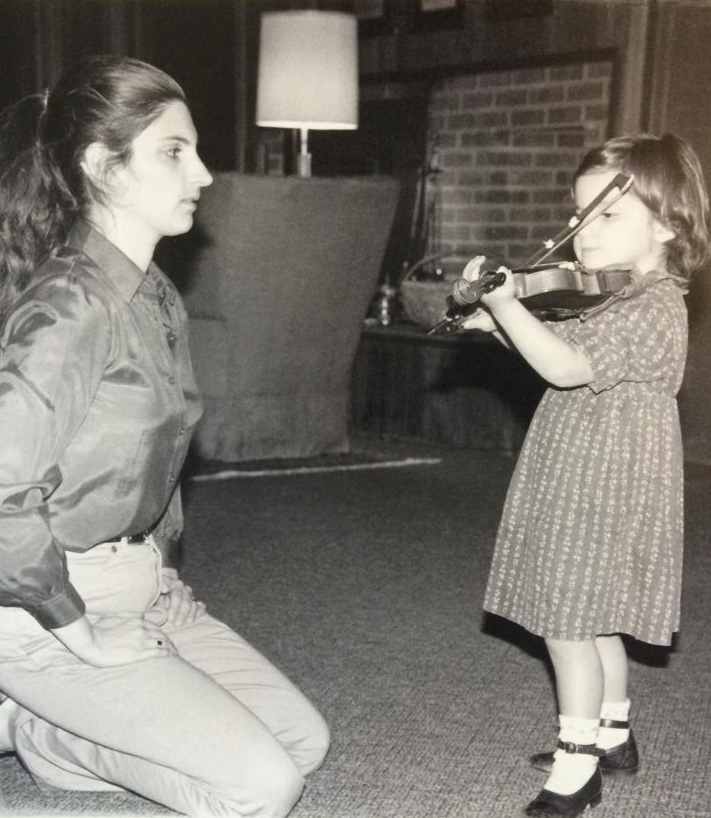Difficult Student? Remember: You’re A Human Being First, A Teacher Second
On a teaching site recently, I saw a post by a worried young instrumental teacher in a remote area who asked for help with her difficulties in teaching a neurologically atypical teenager who was also, for other reasons, an extremely difficult student. One experienced teacher gave her some excellent advice, telling her that this situation may be beyond her scope but still gave some excellent pointers on how to deal with it.
In closing however, he added the following:
“Your not being able to teach her is not your or her fault.” And “Not all teachers can teach all students and not all students can learn from all teachers.”
The first statement is downright discouraging – the absolute assumption that she is going to fail. The second is a truism that I have seen all over the place in various forms and gives us the excuse to shrug our shoulders and give up when faced with difficult and recalcitrant students.
What did the advice giver mean by ‘not be able to teach’ someone? Apparently when a teacher finds herself unable to teach what she wants to or what she thinks the student ought to learn. However, I have never seen a teaching situation where the student didn’t learn something, either positive or negative. And even the most difficult students also learn from any teacher. Whatever is being taught or learned may be completely different from whatever lesson plan the teacher had in mind, but may be exactly what the student needs. In situations like this, there is no success or failure in the usual sense, but there is teaching and learning on both parts. The teacher learns a whole lot about teaching unusual students and the student may learn whatever he needs to, no matter how little that may seem to be – if you’re paying attention and notice it. If the teacher is thinking in terms of succeeding or failing, whether or not she is able to teach that student, she is thinking of herself and not what she is doing, thinking about what she wants to achieve and not necessarily what the student needs.
What is failure, or not being able to teach someone anyway? “I, a violin teacher, am going to teach you the violin. If you don’t learn it the way I want you to or think you should, if you don’t overcome your problems (behavioral or otherwise), then I have failed.” Right?
Wrong. For me, it’s in the eyes of the beholder. Success and failure are not absolutes. There are lots of shades of gray. You can make up your own definition of success and but then that means you have to decide who is succeeding – or not. Also, do you measure your success or the student’s? How do you define your success – by how many pieces the student learns, if they learn anything at all (according to you)? Is teaching about you or the student? Is there ever really any “not being able to teach a student?”
If you feel you are out of your depth, of course it’s best to refer the student to another teacher. If you’re a physics teacher, it’s probably better not to teach history. If you’re a horn player, you probably shouldn’t teach the double bass. In this case, the teacher was trying to teach a child with seriously difficult to handle issues that were beyond what any didactics course could have prepared her for. The responder gave excellent advice but at the end tacked on the above phrases to console the teacher when (according to him) she would fail, i.e., would not able to teach this child: a discouraging and very limited and limiting attitude to have about teaching.
If someone is referred to you and you can’t handle the situation as effectively as you would like, then by all means send your student to someone with more experience or qualifications (I prefer the ones with experience). But what if you’re the only teacher in the area as the above advice-asking teacher?
Here’s what I would advise a teacher facing a difficult situation.
You are not NOT going to be able to teach this child. A teacher always teaches something and a student always learns something. It may not be what we want to teach or what we want them to learn, but it may be what they need – and it may point us in the direction of what we need to learn. We may often find ourselves in situations where there are no choices and we have to go ahead. It is completely counterproductive to have the idea that there are students we can’t teach or who can’t learn from us. It gives us the wrong mindset. We may not be able to teach them as well or effectively as we would like and there may be teachers better suited to them, but that doesn’t mean we aren’t effective or make a positive impact in ways we can’t even imagine – especially if those teachers who may be better suited to such students are not available. Also, sometimes we have our noses so close to the matter at hand that we can’t see the whole picture. So we should just do the research, get good advice (as the above teacher was trying to do), do the best we can, hope for the best and leave the rest up to the universe. Obviously if we feel way out of our depth and there are other options, we can consider them. But when we’re the only show in town, we then have to assume that we’re the right teacher for that child in that moment and give it our all. The idea of success or failure shouldn’t enter our minds. Only how can we do our job better and how can we be of more use to our student. We are never failures if our intention is pure, our hearts are open and we are trying to do our best.
I am reminded of a story one of my teachers told me about Sevcik*, with whom he had studied. (Yes, I am old now but so was he when I was 14.) A violin student came to Sevcik and asked for an opinion of his playing and of his future prospects as a violinist. Sevcik told him that he would be better off to become a shoemaker. Apparently to someone of German culture back then, this was quite an insult and definitely not career advice, which the non-native German speaking student didn’t realize. Years later, that student returned to Sevcik to thank him for his excellent advice: he had given up the violin, became a shoemaker, founded a large company and made a fortune – all due to the misunderstood insult. My teacher told me that Sevcik was quite taken aback. This is perhaps an extreme example, but Sevcik (certainly unintentionally) taught, the student learned and who could say that this teaching wasn’t wildly successful? I’m sure even Sevcik learned something important from this exchange. If Sevcik had merely gently told the student that his prospects were nil and he had better quit the violin, then perhaps this fellow would not have found his profession and made his fortune. Sevcik indeed was the right teacher for that student in that moment. I am not, of course, encouraging teachers to insult their students but this is an excellent example of how we can profoundly influence the lives of our students in ways we cannot possibly imagine and with words and actions that may seem at the time to be insignificant. And how what we mean to say and what is understood are often two completely diffierent things.
Normally, I send students to other teachers when they get to a certain level that I feel they no longer need me pyschologically, emotionally or technically. I had one student who was ready to go on in all three areas really, but I held her back. Why? Because she was having problems in superior school that were causing her a great deal of emotional and psychological distress and far too much homework. I knew she couldn’t practice the violin much during that year, so sending her to another teacher would have been pointless and possibly traumatic, and that she needed some moral support. So I gave it to her, listened and commisserated with her. Finally, when she decided to change schools and her whole world changed for the better, I sent her on to another teacher. Did I fail as a violin teacher? Perhaps, in the sense that she didn’t learn much on the violin that year (but at least she kept playing). But did I fail as a human being? No. And that’s what we must never forget. We are human beings first and teachers second. The same goes for students. If we see them only as little machines which must be taught a certain thing to a certain level in a certain amount of time, we are forgetting their humanity – and ours too.
So when you are having difficulty teaching a student and there aren’t other choices, don’t be anxious. Do what you have to do but remember that sometimes a student may just need contact with and personalized attention from another human being who happens to teach a particular subject. And then do the best you can. Both of you will always learn something.
Post author: Eloise Hellyer
*For those of you unfamiliar with violin pedagogues, Otakar Sevcik (1852 – 1934) was a famed violinist and teacher who wrote many technical study method books which teachers use to this day to torture, er, help their students.
Share this:
Buy it on www.sharmusic.com - eBook format, avaliable worldwide, paperback in North America
COPYRIGHT
ABOUT
A music teacher’s thoughts and observations on the teaching and the study of a musical instrument, hoping to be of help to parents, students and teachers.
PHOTO
AWARDED TOP 25 VIOLIN BLOG
CATEGORIES
TAGS
ARCHIVES
-
Agosto 2022
Agosto 2023
Agosto 2024
April 2015
April 2016
April 2017
April 2019
April 2020
Aprile 2022
Aprile 2023
Aprile 2024
August 2014
August 2015
August 2016
August 2017
August 2018
August 2019
August 2021
December 2014
December 2015
December 2016
December 2017
December 2018
December 2019
December 2020
Dicembre 2022
Dicembre 2023
Dicembre 2024
Febbraio 2022
Febbraio 2023
Febbraio 2024
February 2015
February 2016
February 2018
February 2019
February 2020
February 2021
Gennaio 2022
Gennaio 2023
Gennaio 2024
Giugno 2022
Giugno 2022
Giugno 2023
Giugno 2024
January 2015
January 2016
January 2017
January 2018
January 2019
January 2020
July 2015
July 2017
July 2019
June 2016
June 2017
June 2018
June 2019
June 2020
June 2021
Luglio 2022
Luglio 2023
Luglio 2024
Maggio 2022
Maggio 2023
Maggio 2024
March 2015
March 2016
March 2017
March 2018
March 2019
March 2020
March 2021
Marzo 2022
Marzo 2023
Marzo 2024
May 2015
May 2016
May 2018
May 2019
May 2020
November 2014
November 2015
November 2016
November 2017
November 2018
November 2019
November 2021
Novembre 2022
Novembre 2023
Novembre 2024
October 2014
October 2015
October 2017
October 2018
October 2019
October 2020
October 2021
Ottobre 2022
Ottobre 2023
Ottobre 2024
September 2014
September 2015
September 2016
September 2018
September 2019
September 2020
September 2021
Settembre 2022
Settembre 2023
Settembre 2024
RECENT POSTS
Terry G and Me, or Terry Gilliam on Where (or What) Practicing the Piano Will Get You…
The Teaching We Don’t Do Is More Important Than We Think
Overwhelmingness or What Teaching and Motherhood* Have in Common
Cellphone Serenity
How to Build Your Reputation – the Kind You Want
Desperate Times, Desperate Measures. Or How to Deal With Your Strong-Willed Stubborn Student and Survive
“Why Does My Teacher Get So Frustrated?” Letter to a Perplexed Student
Mount Rush-no-more….And How to Get There
Realizzato con VelociBuilder - Another Project By: Marketing:Start! - Privacy Policy




